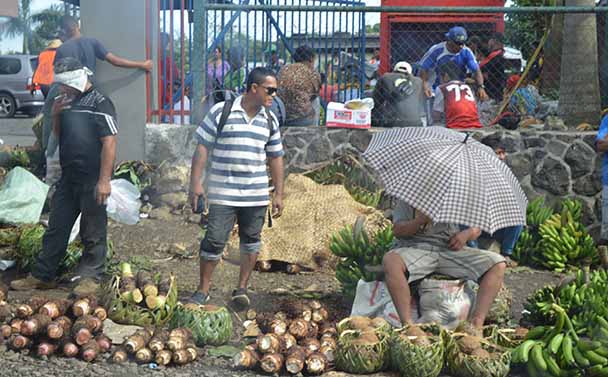By Staff Writer
The Minister of Agriculture, La’auli Polataivao Schmidt, failed to make believers out of everyone in Parliament with his grand export marketing scheme to open up overseas markets to local agriculture produce.
The scheme plans to combine the roles of Government, exporters and farmers in a team effort.
Farmers sell their agriculture produce to importers who in turn export them as a commercial venture to overseas markets.
“Government comes in to negotiate at the Government level against any protective policy hold-ups with the importing country and smooth out the flow of our exports,” La’auli tried to impress.
The scheme also involves adding a second packing house for export at the MAF Atele compound and a new one to be built at Salelologa for Savaii farmers.
Importers will take advantage of the packing houses to handle all farm produce for shipment in large containers for overseas markets.
The Minister’s pet scheme tracks along similar undertakings in the past by the Produce Marketing Division (PMD) and the Copra and Cocoa Boards.
All were eventually forced to close down unable to resolve many of the challenges with the overseas markets.
MAF Minister La’auli knows the history well but brushed it aside.
“This is today and that was tomorrow,” he promised, brimming with confidence in the potential success of his scheme.
His enthusiasm, however, fell on the unconvinced ‘know it all ears’ of the HRPP opposition leader Tuilaepa Sailele Malielegaoi.
With his experience as Prime Minister of more than 20 years, the former Government leader laughed off the MAF Minister’s loud boasts.
“The Minister is good with the sweet talk unfortunately none of us believes him,” Tuilaepa scoffed with a knowing air of the Minister’s character after many years of working together.
La’auli once held the same Ministerial portfolio of Agriculture that he now holds with the FAST Government, when Tuilaepa was Prime Minister.
He was, however, forced to resign over a personal business venture that went sour.
The Government-to-Government approach by the Minister to negotiate quick solutions was shot down by Tuilaepa that it has already been tried and did not work.
The former Prime Minister quoted the example of the PMD and Copra and Coco Boards.
Tuilaepa pointed also to a more recent attempt that was unsuccessful to negotiate at the Government level with New Zealand the export of breadfruit from Samoa over risk fears of fruit fly.
“We tried to take this up with the New Zealand Government and were told they are not involved in direct commercial transactions.”
The opposition leader did encourage the Minister to make full use of the new Samoa House recently built in New Zealand as an outlet to encourage export trading
The option holds a better chance of success based on the promising results of direct selling of popular export produce like taro.
The Indo-Fijian community dominates the New Zealand market for taro and from experience the main reason for success is having their own outlets to sell their imports from Fiji.
“We now have this Samoa House in Auckland as an outlet to sell our taro and this is where the best option stands for our exporters
“What is needed there is better management of the facility.”
The opposition leader is not impressed also with emphasis by the export scheme on the support of the Samoan diaspora in main markets like New Zealand and Australia.
He placed the home support appeal third overall when it comes to what Samoans choose to buy.
“Sale prices and what they can afford with money in the pocket are the two purchasing factors that determines what they buy.”
Plans by the MAF Minister to have the national research organisation, SROS, play a key part in the export scheme is little surprise as well for Tuilaepa.
He would, however, prefer that SROS researches concentrate on new agricultural based products that would appeal to the local market if the export option is not working.
Among the main benefits is being spared the import protection policies in outside markets and not having to compete against other rival products.
Local whiskey and breadfruit flours are better known success examples from SROS research that can be promoted well for local use.
Tuilaepa also offered another better option raised during his Government of incorporating SROS into a bigger state owned operation, to deal with the selling and marketing of products from research for the local market.
He tried to contain the overflowing confidence of the MAF Minister in the hope that he does not branch out on his own with setting up his marketing export scheme and running with.
“Hope you have Cabinet approval for that.”
The former leader’s pointed remark again underlined his experience of the Minister’s character.
